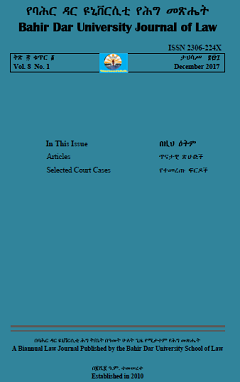Protection of Tenure Security in Private Renting under Ethiopian Residential Lease Law: A Comparative Study
Abstract
Rental tenure or residential lease is the most common residential tenure in urban centers in Ethiopia. Despite its dynamic nature, the sector is still regulated by the Civil Code, enacted six decades ago. This article aims to review the protection of tenure security of lessees in private rental housing in the Ethiopian residential lease law. The experience of some jurisdictions in the protection of tenure security is also reviewed. The article finds that Ethiopian law lacks minimum rules on a number of factors that safeguard security of tenure including minimum lease term, rent increment, lease renewal, notice period and forced eviction. Accordingly, the lessor can give short-term leases and then terminate it upon expiration, increase rent anytime and by any percentage, terminate the lease and evict the lessee at any time for no cause. The lessor is also not required to give notice regarding the various measures he/she takes. Thus, safeguards that are necessary to protect tenure security are either non-existent or poorly utilized. Hence, lessees are left largely unprotected, which makes life in rental units insecure and unstable. The study recommends urgent revision of the residential lease law to incorporate minimum rules that are necessary to protect security of tenure and bring security and stability to millions of lessees in the country, and thereby meet the country's human rights obligations in relation to the right to adequate housing.
